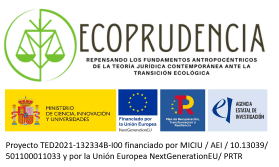March 22 and 23, 2023
Room 1.A.01. Puerta de Toledo Campus. UC3M
The seminar “Jurisprudence in the face of ecological transition: nature from the margins of law” is organized within the framework of the research projects Ecoprudencia: "Review of the anthropocentric foundations of contemporary legal theory in the face of ecological transition", a project funded by the Spanish State Research Agency (TED2021-132334B-I00/AEI/10.13039/501100011033) in the 2021 call for “Strategic Projects Oriented towards Ecological and Digital Transition”; Theories of Justice and Global Law of Human Rights [JUSGLOBAL], a project funded by the Spanish State Research Agency (PID2019-107172RB-I00 / AEI / 10.13039/501100011033); and On trust-cm. Interuniversity Program on the Culture of Legality (H2019/HUM-5699) funded by the Regional Ministry of Education and Research of the Community of Madrid and the European Social Fund.
Almost 50 years after Principle 1 of the Stockholm Declaration on the Human Environment highlighted the environmental dimensions of civil and political rights, more than a hundred conventions, treaties, and international declarations on environmental matters have been enacted, 26 Conferences of the Parties have been held, and at the national level, more than 20 laws regulating environmental issues have been passed. Despite all this, the climate emergency continues to grow. Nearly 50 years later, the anthropocentric legal strategy seems to have failed.
At the center of this failure lies the absence of nature as an active participant in the discussion and shaping of environmental administrative and criminal law, which, even in its interaction with human rights, has granted the State exclusive capacity for representation and decision-making over nature. Among the problems of this approach is an ambivalence between a regulatory trend and, paradoxically, a deregulatory one. The regulatory trend, although successful in some cases, has led to the progressive bureaucratization of environmental policies and procedures, making them ineffective and distant from affected communities. Meanwhile, the deregulatory trend, characterized by voluntary measures, market-based approaches, and incentives and taxes, tends to prioritize economic and competitiveness considerations over environmental requirements. These trends also often refer to scientific knowledge as the only source to predict environmental outcomes and guide risk management. This causes the failure in managing and controlling natural processes and risks to be attributed not to a civilizational problem, but to a lack of knowledge or competence. In response, it has been proposed to see risk not as the probability of harm, but as the embodiment of deeply rooted cultural values and beliefs.
Despite the central role that Law should play in the ecological transition project, so far the anthropocentric paradigm that dominates its implementation has created significant gaps between the legal and the ecological. We believe this gap must be addressed, recognizing the inevitable interdisciplinarity and epistemic diversity surrounding our understanding of the natural world and its representation. Rights of nature, ecological law, climate justice, and ecological justice constitute the emerging framework through which new claims of the ecological movement are being brought into law. To fully develop the civilizational potential of this new approach, legal philosophy and dogmatics must be prepared to produce the corresponding analysis of the concepts and arguments that justify it. This project seeks to contribute to building this theoretical foundation, considering that, ultimately, all initiatives developed through technological and social advancement aimed at achieving the ecological transition will require a legal framework and new jurisprudence to accommodate and support them—not as a new top-down ordering strategy, but as a bridge toward local, adaptive governance fostering ecological citizenship.
Within these objectives, this seminar aims to foster a debate on how the demands for ecological transition are transforming the discourse on Law. Specifically, we identify and structure four dialogue tables that will address how the ecological paradigm is impacting legal institutions, judicial actors, the formulation of other rights, and the construction of social identities and cultural practices. The questions each working group seeks to answer are: 1) What legal institutions does the ecological transition demand, and what lessons can be learned from Latin American and European experiences? 2) How can citizen participation in the construction of ecological transition projects be ensured? 3) What kind of ecological transition do we want to promote through law, and what are the advantages and risks of the available alternatives? 4) How can we build ecological awareness that respects the rights and practices of local communities?
To answer these questions, we have assembled a panel of speakers from Europe and Latin America who are experts in each of the identified working areas. Finally, the international, gender-balanced, and interdisciplinary composition of each working group seeks to promote a diverse dialogue on each of the topics addressed.
Cursos y Workshops



